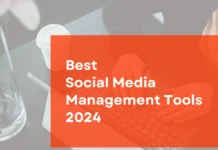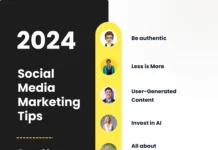
Social media accounts have become very popular among hackers, especially accounts with large followings. In 2020, a teenager managed to hack several Twitter accounts of very well-known people, including Bill Gates and Barack Obama. The teenager posted tweets asking people to send 1000 dollars worth of bitcoin through a specified link with the promise to send back double.
So even Bill Gates’ cybersecurity efforts weren’t strong enough to keep his account safe. If someone like him can get hacked, then your social media accounts can, too, unless you follow certain safety rules. Read on to learn the top 9 social media security mistakes and how to avoid them.
9 Social Media Security Mistakes
- Using weak passwords
Creating easy passwords is a great way to ensure you won’t forget them and get blocked from your accounts. However, this comes with great risks because simple passwords are easy to hack.
Cybercriminals can utilize so-called brute force attacks and try out thousands of passwords within a very short period. If you use one-word passwords like “unicorn”, “crocodile”, or simply “password”, then your accounts are not safe from these attacks.
- Using the same password for all accounts
If one of your social media accounts gets hacked, make sure that others can’t be accessed using the same login information. Each of your accounts should have a different password. However, this can be tiresome, especially if you have many accounts.
The good news is, there is special cybersecurity software that can make it much easier to keep your accounts safe. A password generator, for instance, can create complicated passwords for all of your accounts, and a password manager can encrypt and remember them for you.
- Blindly using third-party apps
Connecting your account to a third-party app also means connecting the security of your account to that of the third-party app. If an app isn’t secure and has many vulnerabilities, your account and login info are also vulnerable.
Always do your research before installing third-party apps and try to limit their number as much as possible. Only download the absolutely necessary ones.
- Failing to use multi-factor authentication
Multi-factor authentication is a simple yet effective way to keep your social media accounts secure, which is why important institutions like banks often require it. After all, it’s highly unlikely that a hacker will acquire access to both your password and your smartphone. So don’t forget to take this crucial step in securing your social media accounts.
- Giving too many people access to accounts
Employees often have access to way too much sensitive data, including social media login information. The problem is that the more people with access to the data, the higher the risk of it being leaked or misused.
Whether an employee deliberately leaks the data because they dislike their boss or they give it away by accident, the result is the same. So make sure to only give social media login info to those who directly need it.
- Failing to register on all social media platforms
Even if your business only uses Instagram, you should still register on Facebook, TikTok, Linkedin, Pinterest, Youtube, and any other social media accounts you can think of. First off, you’ll prevent others from using the same brand name. Second, you’ll prevent imposters from posing as representatives of your business.
- Failing to keep a backup
No matter how careful you are on social media, there’s always the risk of getting hacked, which alone would be a big problem. An even bigger problem would be to lose all of your data with no way to retrieve it. That’s why you should always keep a backup and constantly update it.
- Using public wifi
Public wifi is often unencrypted. This means that hackers can intercept your connection and spy on everything you do online. If you have access to several social media accounts, that’s a jackpot for hackers. If you can’t avoid public wifi, at least always use a VPN when you’re on it. A VPN encrypts your data, creating a safety barrier from hackers.
- Falling for phishing schemes
Phishing is when hackers try to get users to reveal sensitive information by pretending to be legitimate websites or individuals. When it comes to social media, you should look out for phishing websites.
For instance, hackers can create websites like “youtub3.com” and make it look exactly like youtube.com. If you log into a website like this, the hacker gets your login info. So always keep an eye on the URLs.
Ready to stop making these mistakes?
Hopefully, this article was enough to get your social media security back on track. Don’t worry about each one of these mistakes right at this moment. Social media security requires commitment and a willingness to learn. To make sure you don’t get overwhelmed, start by increasing your password security and only then move on to other issues.
See also: Social Media Mistakes You Must Avoid When Branding Your Business











